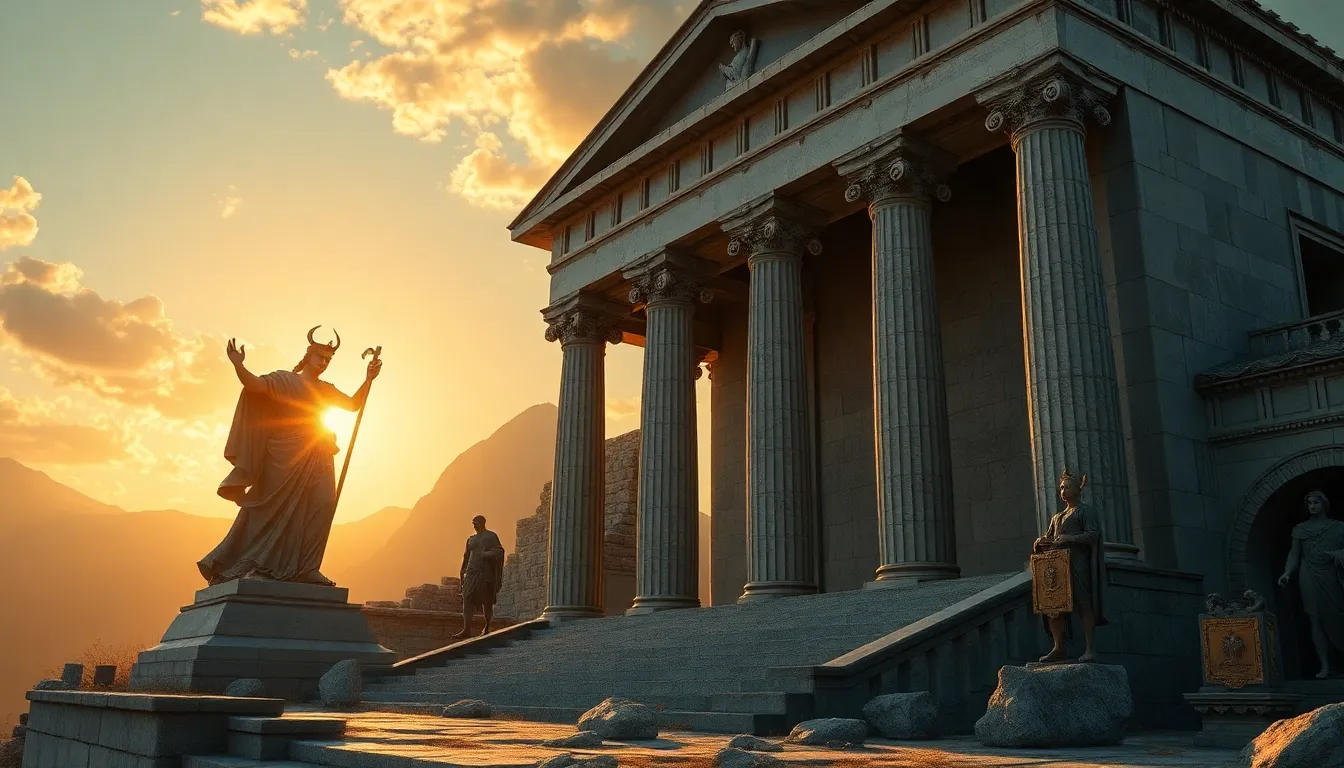The Greek Pantheon and Its Influence on Modern Fantasy Literature
I. Introduction
The Greek pantheon is a rich tapestry of gods, goddesses, and mythical creatures that have captivated human imagination for centuries. This ancient mythology serves as a foundation for a vast array of literary works, spanning from antiquity to modern times. The importance of these myths in literature cannot be overstated, as they imbue narratives with depth, moral lessons, and universal themes.
The purpose of this article is to explore the profound influence of Greek mythology on modern fantasy literature, examining how ancient stories continue to resonate in contemporary storytelling and shape the narratives we cherish today.
II. The Greek Pantheon: An Overview
The Greek pantheon consists of a multitude of deities, each with distinct personalities, domains, and stories. Some of the key gods and goddesses include:
- Zeus: The king of the gods, associated with the sky, lightning, and justice.
- Hera: The queen of the gods, protector of marriage and women.
- Athena: Goddess of wisdom, war strategy, and crafts.
- Poseidon: God of the sea, earthquakes, and horses.
- Apollo: God of the sun, music, arts, and prophecy.
- Artemis: Goddess of the hunt, wilderness, and childbirth.
Major myths stemming from these deities often encompass themes of heroism, morality, and the human condition. For example, the myth of Heracles showcases the hero’s journey, while the story of Persephone and Hades explores themes of love and loss.
In ancient Greek culture, the pantheon played a crucial role in explaining natural phenomena, instilling moral lessons, and providing a shared narrative framework for understanding the world.
III. Core Themes of Greek Mythology
Greek mythology is filled with core themes that resonate throughout literature and storytelling:
- Heroism and the hero’s journey: Many myths detail the trials of heroes, such as Odysseus and Theseus, who embark on quests that test their courage, wisdom, and strength.
- The conflict between mortals and gods: These stories often highlight the struggles of human characters against divine beings or fate, illustrating the fragility of human existence.
- Love, betrayal, and moral lessons: Tales such as those of Orpheus and Eurydice explore the complexities of love, while the story of the Trojan War imparts lessons on pride and vengeance.
IV. The Legacy of Greek Myths in Fantasy Literature
The legacy of Greek mythology in fantasy literature is both profound and varied. Numerous modern works draw directly from ancient myths, while others incorporate symbolic and thematic elements:
- Direct adaptations: Authors like Rick Riordan have created series such as “Percy Jackson & The Olympians,” which reimagines Greek gods in a contemporary setting.
- Symbolic and thematic borrowings: Themes of fate, heroism, and moral ambiguity permeate the works of fantasy authors, influencing narratives and character development.
Notable authors influenced by Greek mythology include:
- J.R.R. Tolkien: His works, particularly “The Silmarillion,” echo mythic structures and themes found in Greek lore.
- Neil Gaiman: In books like “American Gods,” Gaiman weaves ancient deities into modern narratives, exploring their relevance in today’s world.
V. Greek Mythology in Contemporary Fantasy Worlds
Contemporary fantasy literature often integrates mythological elements in creative and innovative ways:
- World-building: Authors use Greek mythology to create rich, immersive worlds that resonate with readers on a cultural and emotional level.
- Fantasy series: Works such as “Circe” by Madeline Miller offer fresh perspectives on classical myths, exploring the lives and motivations of mythological figures.
These modern adaptations blend myth with contemporary storytelling techniques, making ancient tales accessible and relevant to today’s audiences.
VI. Archetypal Characters and Tropes
The archetypes found in Greek mythology have become foundational in fantasy narratives:
- The archetype of the hero: Characters often embody the “reluctant hero,” facing internal and external conflicts, much like Odysseus on his journey home.
- Gods and mythical creatures: The presence of gods, demigods, and creatures such as centaurs and gryphons enrich fantasy worlds, providing depth and intrigue.
- The concept of fate and prophecy: Many modern stories draw upon the Greek concept of fate, where characters grapple with their destinies, mirroring the struggles of figures like Oedipus.
VII. The Impact of Greek Mythology on Readers and Culture
The enduring appeal of Greek myths manifests in various aspects of modern society:
- Influence on pop culture: Beyond literature, Greek mythology permeates film, video games, and art, demonstrating its timeless relevance.
- Educational aspects: Fantasy literature serves as a tool for teaching mythology, inviting readers to explore the rich narratives of ancient cultures.
VIII. Conclusion
In conclusion, the influence of the Greek pantheon on modern fantasy literature is significant and multifaceted. Ancient myths continue to inspire contemporary storytelling, enriching narratives with themes of heroism, moral complexity, and the eternal struggle between mortals and the divine. The ongoing relevance of these myths ensures that they will remain a vital part of literature and culture, reminding us of the profound connections between our stories and those of the past.
As we explore the fusion of ancient myths with modern fantasy narratives, we find a captivating interplay that invites us to reflect on our own journeys and the universal truths that bind us across time and space.




